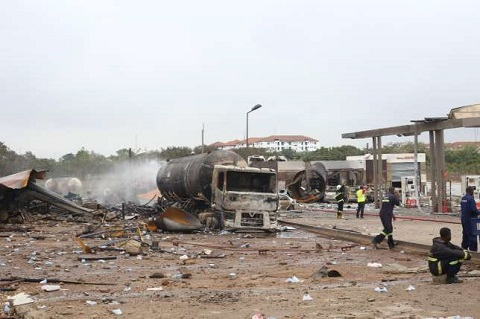FLASHBACK: A scene at Atomic Junction
The National Petroleum Authority (NPA) has adopted a roadmap to assist in the implementation of the national LPG Policy one year after the deadly gas explosion at Atomic Junction in Accra.
The policy is to ensure that at least 50 percent of Ghanaians have access to safe and environmentally friendly Liquefied Petroleum Gas (LPG) for domestic, commercial and industrial use by 2030 through the Cylinder Recirculation Model (CRM) of LPG distribution.
The policy was formulated in response to the deadly gas explosion at Atomic Junction, Madina in Accra on October 7, last year, which claimed seven lives.
The explosion that created huge fireballs in the sky in the north-eastern part of Accra at about 7:30 pm greatly shocked the nation and also emphasized the need to tighten regulations in the industry.
The inferno destroyed several property and wares, including the adjacent Total filling station.
Over 20 vehicles, including two fuel tankers, were also gutted.
Following the incident, Cabinet called for a number of measures including the implementation of the National LPG Policy on 12th October, 2017 through the Cylinder Recirculation Model (CRM) of LPG distribution.
The Ministry of Energy subsequently directed the National Petroleum Authority (NPA) to constitute an implementation committee to plan and execute the policy.
The CRM policy is aimed at addressing concerns about public safety, product quality, accessibility, availability and affordability.
The constituted National LPG Policy Implementation Committee, including non LPG service providers, adopted a roadmap to assist in the implementation of the policy.
The roadmap focuses on a regulatory framework, cylinder recall, decommissioning of high risk refilling plants, as well as training of stakeholders.
Petroleum service providers involved in the consultation process include Bulk Distribution Companies (BDCs), storage companies, Oil/LPG Marketing Companies, tanker drivers and LPG refilling plant operators.
Others are members of the Council of State, National House of Chiefs, Parliamentary Select Committee on Mines and Energy, Regional Houses of Chiefs, Municipal and District Assembly officials and Organized Labour.
The rest are women groups, market women, traditional caterers and the general public.
A statement from the Corporate Affairs Division of NPA stated that while NPA is hopeful the full implementation of the measures will ensure safety, it’s in the interim collaborating with the Oil Marketing Companies (OMCs) and other relevant stakeholder agencies to enhance the capacity of persons involved in the handling of petroleum products, including tanker drivers and their mates.”
“This will help curb or reduce any unforeseen petroleum products related accidents. Meanwhile, risk assessment of all LPG refilling plants in all the 10 regions have been carried out. The findings will be part of the general implementation of the policy,” the statement added.
It also expressed condolences to the families of those who lost their lives in that unfortunate incident, as well as injured persons.
By Gibril Abdul


